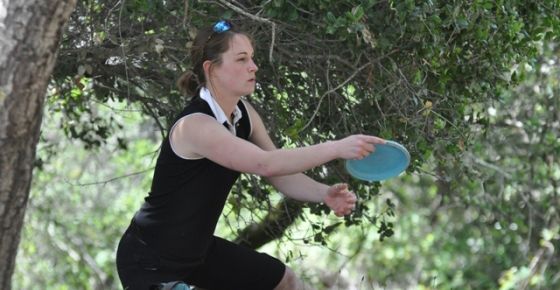My “Be a Better Golfer” Philosophy

Disc golf, just like traditional golf, incorporates many different disciplines. From the mental game, to the physical ability, naturally gifted talents and the art of managing them all together, when every single stroke counts.
A friend, a few years ago, recommended I read, Golf Is Not a Game of Perfect by Sports Psychologist Dr. Bob Rotella. And now, I recommend it to anyone who is serious about coming up with a game plan to become a better player and possibly, through the process, a better person. His short book will help illuminate all those pesky, seemingly unsolvable problems players stumble on when they know they are a good player, but something changes as soon as the two minute horn is blasted.
The uncontrollable part of the mental game is much trickier and takes the utmost discipline and extreme amounts of faith, patience and confidence. Players can only convince THEMSELVES that they will make a good shot or putt. After a bad shot, this positive mentality is tested the most. There hasn’t been even ONE round of disc golf, in competition or not, where I haven’t struggled getting confidence back after a bad shot. Every player, world champion or not, will struggle getting back to a good state of mind after the confidence slips. “Negative thinking is almost 100 percent effective,” Dr. Rotella writes in his book. Think about that for a minute… when we’re on the tee pad and look at that first tree and think, “don’t hit that,” what happens? We hit it! Now try to flip that thought process around. Look at the available line of flight and envision your disc flying that path. That’s what Dr. Rotella considers confidence. Now, will you 100 percent of the time hit your exact line? No. Not possible. But if you keep envisioning the path you want to take, it WILL help build your confidence right back up to where it was before you hit that tree. Trust me, it’s NOT easy.
Here’s my tee pad thought process at the Beaver State Fling in Portland, Oregon a few years back:
“Don’t hit that tree, ahhh, don’t think that!”
“You can’t think that, you’ll hit it.”
“Look at how much space is available, but stay away from that tree”
“Stop thinking about that tree”
“Ok, there is the path, take that path, but avoid the tree.”
This is quite the mental battle on the tee pad, and I hit the tree. But it was a start at first recognizing what I was thinking, why I was thinking and trying to change that unconscious fear of hitting the tree. Any time we attempt a change; it can be a rough, rocky road. We have to acknowledge that there is a hazard but we can’t let that be the majority of our thought process. Now I stand on tee pads and practice seeing what I want to happen, instead of what I don’t want to happen. “Progress is impossible without change, and those who cannot change their minds cannot change anything,” Nobel Prize winning playwright George Bernard Shaw said. Like everything else in golf and life, this discipline takes practice and constant attention.
Disc golf is a marriage of the uncontrollable and the controllable. So now, let’s look at the controllable aspect!
The things that are in my control are my athletic ability and part of my mental game. Let’s first look at the part of the mental game that is controllable. Having a clear mind on the disc golf course is absolutely essential! And to some degree, every player can ensure their personal affairs are in the best order they can be before they play in competition. Here’s an example: I can clearly remember not fully concentrating on a drive in Fountain Hills, Arizona at the Memorial Championships and proceeded to throw one of my favorite drivers right into the water. What was I thinking about that distracted me so? I had a strand of doubt filter through my mind about whether or not I was late on my cell phone bill. It’s a stupid reason to lose concentration and what ended up being 3 strokes because the very next shot was frustrated. But if I had my affairs in order, I would have been able to give ALL my concentration to that shot and I KNOW, in my heart, I would have saved a few strokes! Correcting little things like that are under my control. A friend once told me, “Golf mimics life.” I can’t help but notice that when things are going well in my life, my golf game improves. It’s not just monthly bills, it’s relationships with friends, family, traveling plans, knowing my dog will be let outside, knowing where there is a restroom to use, where I’m going to eat lunch, etc. It’s about satisfying everything else in order to free your mind to concentrate on where you want your disc to land. Sometimes, thoughts in our head are so loud that we can’t turn them down, so I say; turn down all the ones that are within our control and let your mind be in the moment, every moment.
Practice is important, of course. But how are we all practicing? Are we playing round after round? Or are we hitting the field with our midranges and making them turn right, left, move slow and fast? Do we only practice distance driving? Do we practice accuracy? If we want to become a better golfer we have to practice it ALL. One of the worst feelings in competition is getting to shot that we know we haven’t practiced. Practice embeds confidence. When we can calm down our minds, and remember what it feels like to produce the shot we need we can then dig deep and harness the feeling of that shot and make it happen! No one can outline exactly what each player needs to practice because it’s personal. It revolves around individual strengths and weaknesses, goal and ambitions. If your goal is to be a good casual player, you won’t spend hours at the putting green. If your goal is to be a world champion, you probably will. I know I will learn more throwing 18 drives in an open field (envisioning different lines) than I will playing 18 holes tee pad to basket. Now I’m not recommending that we don’t play practice rounds, but let’s break this down. It takes about 10 minutes to throw 18 drives in a field, maybe another 10 minutes for 18 midrange shots and probably 10 minutes for 18 good practice putts. That’s going to amount to roughly 30 minutes. I’ve never played a 30-minute round of golf. At this rate, I can play three rounds of ‘field golf’,tripling my practice time and learning three times as much as just one round of “tee pad to basket” golf. Don’t get me wrong; there is absolutely a time and a place to play practice rounds. I reserve those practice rounds for casual time and treat them as competitive rounds and make myself accountable for every stroke. In that sense, I am practicing tournament golf.
As much as golf is a mental discipline and a practice routine, it’s also about preparing your body to handle an explosively athletic throwing motion and the sheer repetition of enduring a round of disc golf. This part will benefit every aspect of your life. “Physical fitness is not only one of the most important keys to a healthy body, it is the basis of dynamic and creative intellectual activity,” 35th United States President John F. Kennedy wrote for Sports Illustrated. He tried to convey, using references from ancient Greece that the mind performs better when the body is in good physical condition. The most controllable and, I think, the easiest part of my “be a better disc golfer” philosophy is keeping in good physical shape.
